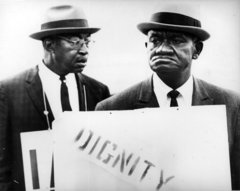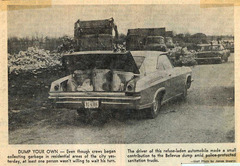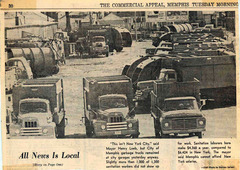- Home
- Introductory Essay
- Lives of the Sanitation Workers
- The Strike Begins
- Negotiations, Vigils, and Sandwiches
- The Macing March
- A Community Awakens
- A Nation Awakens
- Dr. King Arrives In Memphis
- Terrible Thursday
- The Men March, The Guards Watch
- I've Been To The Mountain Top
- Lorraine Motel
- Mourning
- Victory for Local 1733
- Impact on the South, 1968-1970
- Remembering Memphis
- Resources
- Credits/Contact
The Strike Begins
On a rainy February afternoon, two black sanitation workers sat inside the back of a garbage truck to stay dry. Old and poorly maintained, an electrical short in its wiring caused the compressor to start running, and Echol Cole and Robert Walker were crushed to death. The Memphis Sanitation Department gave the families of each worker a month's pay plus $500 for funeral expenses. No city official attended the funerals and no further compensation was extended.
On the evening of February 11, T.O. Jones, president of Local 1733 of the American Federation of State County and Municipal Employees (AFSCME), held a meeting with sanitation workers to discuss the recent deaths, partial pay on rainy days and safety conditions. They ultimately decided that enough was enough and voted to strike. Taylor Rogers, an organizer with Local 1733 said, "If you bend your back, people can ride it. But if you stand up straight, people can't ride your back. And that's what we did. We stood up straight."
From the I Am A Man Exhibit Symposium
Wayne State University Walter P. Reuther Library
Taylor Rogers, a striking sanitation worker and leader of AFSCME Memphis Local 1733, discusses the conditions that finally pushed the workers to strike. Filmed 10/10/2003. Digitized August 2011. Clip extracted December 2011.
Download Video: MP4 HTML5 Video Player by VideoJS
Memphis Local 1733 strikers demand dignity during their 1968 campaign. (Creator: Copley, Richard L.; Date: 1968)
Memphis resident can't wait for crews to pick up garbage and drives own trash to Bellevue dump. (Creator: Shearin, James; Date: 1968)


